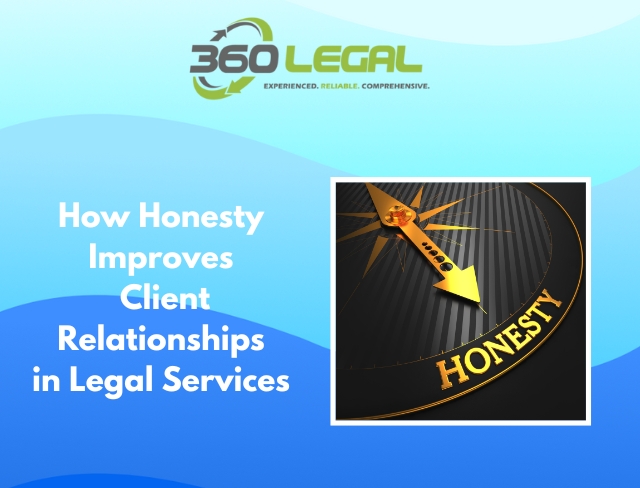Testing RSS Feeds.. ignore post.
Testing RSS Feeds.. ignore post.
How Honesty Improves Client Relationships in Legal Services

Trust is the foundation of any successful relationship, and in the legal profession, it’s paramount. Imagine entrusting your most sensitive matters to a legal team, only to discover they’ve been dishonest or withheld crucial information. It’s a breach of trust that can have severe consequences. That’s why honesty is a cornerstone of effective legal services and a key factor in building strong, lasting client relationships.
The Value of Honesty in Legal Services
The legal profession is governed by strict ethical codes that emphasize honesty and integrity. Legal professionals have a duty to uphold the highest standards of honesty, not only because it’s required by law but also because it’s crucial for maintaining client trust and credibility.
Dishonesty can have severe consequences, such as legal sanctions, damage to professional reputation, and loss of client trust. On the other hand, honesty fosters transparency, builds confidence, and cultivates long-term client loyalty.
By being honest and transparent from the outset, legal professionals establish a foundation of trust that enables open communication and collaborative problem-solving, ultimately leading to better outcomes for clients.
Building Trust through Transparent Communication
Effective communication is essential in legal services, and honesty plays a vital role in fostering trust and understanding. Legal jargon can create barriers, leaving clients feeling confused or uncertain about their case.
The following is a DRAMATIZATION AND IS NOT AN ACTUAL EVENT: During a consultation, a client expressed frustration over the lack of clear communication from their previous legal team. They felt kept in the dark about the progress of their case and the potential challenges they might face. This lack of transparency ultimately led to mistrust and a breakdown in the client-attorney relationship.
By using plain language and avoiding unnecessary legal jargon, legal professionals can communicate complex legal concepts in a way that clients can easily understand, fostering trust and transparency. Being upfront about potential challenges, timelines, and costs is crucial for building trust and managing client expectations. Clients appreciate candor and honesty, even when the news isn’t favorable, as it allows them to make informed decisions and plan accordingly.
Ethical Practices and Integrity in Legal Services
The legal profession is guided by unique ethical standards and codes of conduct that demand the highest levels of honesty and integrity. These ethical guidelines serve as a compass, ensuring that legal professionals prioritize their clients’ best interests and uphold the principles of justice and fairness.
By adhering to these ethical standards and leading by example, legal professionals can create a culture of honesty within their organization, inspiring their colleagues and staff to uphold the same values.
Demonstrating ethical practices and integrity in all aspects of legal services, from client communication to courtroom conduct, builds trust and credibility with clients, opposing counsel, and the judicial system.
Addressing Mistakes and Resolving Conflicts
Despite best efforts, mistakes and conflicts can sometimes arise in legal services. How these situations are handled can make or break a client relationship.
The following is a DRAMATIZATION AND IS NOT AN ACTUAL EVENT: A law firm made a clerical error that delayed the filing of a crucial document, jeopardizing their client’s case. Instead of attempting to cover up the mistake, the firm took full responsibility, communicated transparently with the client, and worked diligently to rectify the situation.
Taking responsibility, being transparent, and addressing issues promptly is essential for maintaining trust and preserving the client relationship. Legal professionals should prioritize open communication and actively work towards resolving conflicts in an honest and professional manner.
When addressing mistakes or conflicts, it’s crucial to use clear language and avoid defensive or confrontational approaches. This fosters understanding and helps de-escalate tensions, creating an environment where solutions can be found collaboratively.
Conclusion
Honesty is the bedrock of successful client relationships in legal services. By embracing honesty as a core value, legal professionals can build trust, foster transparency, and cultivate long-lasting partnerships with their clients.
Remember, clients entrust legal professionals with their most sensitive matters, and honesty is the key to earning and maintaining that trust. By prioritizing ethical practices, clear communication, and a commitment to addressing issues openly and honestly, legal professionals can strengthen their relationships with clients and establish a reputation for integrity and excellence.
Take action today and make honesty a priority in your legal practice. Doing so will not only benefit your clients but also contribute to the overall integrity of the legal profession. Embrace honesty, build trust, and watch your client relationships flourish.
FAQs
1. Why is honesty so important in legal services?
Honesty is essential in legal services because it builds trust and credibility with clients. Legal professionals have an ethical obligation to uphold honesty and integrity, as dishonesty can have severe consequences, such as legal sanctions, damage to professional reputation, and loss of client trust.
2. How can legal professionals communicate honestly with clients?
Legal professionals can communicate honestly with clients by using plain language, avoiding legal jargon, and providing clear and transparent information about the case, potential challenges, timelines, and costs. Being upfront and managing client expectations is crucial for building trust and fostering a productive client relationship.
3. What should legal professionals do when mistakes or conflicts arise?
When mistakes or conflicts arise, legal professionals should take responsibility, be transparent, and address the issues promptly. Open communication, a willingness to resolve conflicts collaboratively, and the use of clear language are essential for maintaining trust and preserving the client relationship.
4. How can legal organizations promote a culture of honesty?
Legal organizations can promote a culture of honesty by adhering to ethical standards and codes of conduct, leading by example, and encouraging open and transparent communication within the organization. By prioritizing honesty and integrity, legal professionals can inspire their colleagues and staff to uphold the same values.
By embracing honesty as a guiding principle in your legal practice, you not only strengthen client relationships but also contribute to the integrity and credibility of the legal profession as a whole. Contact 360 Legal today at (888) 360-5345 to learn more about how our commitment to honesty can benefit your legal matters.
Author
We are Social!
Latest tweets
Popular Tags
Testimonials
"5 star service ! prompt serving, helpful, professional . "
"Mike is awesome. Our firm has hired him on several occasions and we are very happy with his work. His prompt serving, helpful, professional and always in communication. I recommend him highly! "
"360Legal provides speedy and easy to use Process Service that is flexible, and very transparent with nearly instant reporting. It is very helpful for us to be able to track the status of our process service jobs, especially when they are time sensitive. "
Latest News
-

RMAI 2021 Annual Conference RMAI Annual Conference
April 12-15, 2021 -

NATIONAL CREDITORS BAR ASSOCIATION 2020 SPRING CONFERENCE
May 19-21, 2021 -

ALFN ANSWERS 2021
Jul 18-21, 2021 -

Annual Convention and Expo
Oct. 17-21, 2021 -

Florida Association of Professional Process Servers 33rd Quarter Board Meeting/Professional Beach Getaway
Aug. 20-22, 2021












